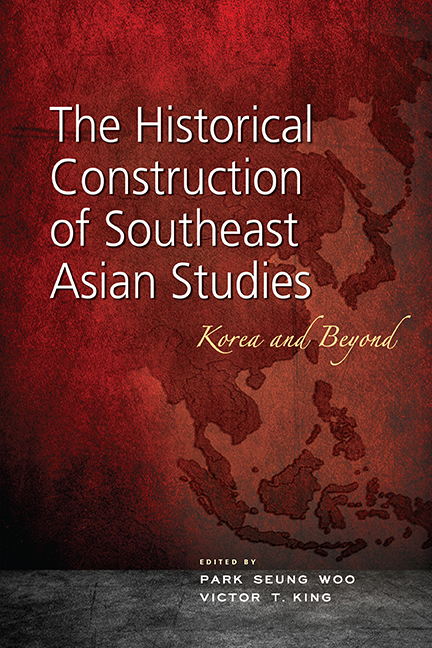Book contents
- Frontmatter
- Contents
- List of Tables
- List of Figures
- Foreword
- Acknowledgements
- About the Contributors
- 1 Introduction: The Historical Construction of Southeast Asian Studies and the Emergence of a Region
- PART I NORTHEAST ASIA
- PART II SOUTHEAST ASIA
- PART III EUROPE
- 8 British Perspectives on Southeast Asia and Continental European Comparisons: The Making of a Region
- 9 It is Hard to Teach an Old Dog New Tricks, But There is Life in It Yet: The Decolonization of Indonesian Studies in the Netherlands
- PART IV AUSTRALIA AND THE U.S.
- Index
9 - It is Hard to Teach an Old Dog New Tricks, But There is Life in It Yet: The Decolonization of Indonesian Studies in the Netherlands
from PART III - EUROPE
Published online by Cambridge University Press: 21 October 2015
- Frontmatter
- Contents
- List of Tables
- List of Figures
- Foreword
- Acknowledgements
- About the Contributors
- 1 Introduction: The Historical Construction of Southeast Asian Studies and the Emergence of a Region
- PART I NORTHEAST ASIA
- PART II SOUTHEAST ASIA
- PART III EUROPE
- 8 British Perspectives on Southeast Asia and Continental European Comparisons: The Making of a Region
- 9 It is Hard to Teach an Old Dog New Tricks, But There is Life in It Yet: The Decolonization of Indonesian Studies in the Netherlands
- PART IV AUSTRALIA AND THE U.S.
- Index
Summary
INTRODUCTION
How can people shake off the yoke of colonization? The question pertains as much to the colonizers as the colonized and by the time most of the citizens of a country ignore this question as something from an irrelevant, distant past social scientists are still motivated, perhaps they feel compelled, to reflect on the matter. In this chapter I want to consider how Dutch social scientists who currently work on Indonesia have come to terms with the colonial ties, which, whether they like it or not, bind them to their subject.
The importance of these colonial ties weighs very unevenly on different disciplines in the social and natural sciences, and the humanities and technical fields. I do not think Dutch anthropologists concentrating on contemporary issues or culture (vernacular architecture, batik, informal sector, urban waste), geographers, economists, linguists, and communication scientists looking at the modern media are very much influenced by the former colonial relationship, and for them Indonesia is just another country from the Global South. For Dutch botanists Indonesia is definitely not just any country, and there is for instance a direct ancestry from De landbouw in den Indische archipel (Agriculture in the Dutch Indies Archipelago, Van Hall and Van de Koppel 1946–1950) to the Plant Resources of South-East Asia project (Westphal and Jansen 1989), but this field is not overly burdened by value judgements. Dutch civil engineers, who are sometimes called upon to rehabilitate drainage systems in Indonesia, are strongly aware of the colonial heritage, but with a positive, unproblematic feeling. A recent work on Dutch civil engineering in Indonesia (Ravesteijn and Kop 2008), for instance, gives an excellent overview of Dutch technical achievements, but uses an unashamedly Eurocentric perspective and by and large ignores indigenous solutions found to technical problems.
The need to come to terms with the colonial past has been most pertinent for historians, and for anthropologists and sociologists with a historical inclination. In the remainder of this chapter I will also call these anthropologists and sociologists “historians” for the sake of brevity. Much, if not most, of their work dealing with issues like, for example, ethnic and class relations, nation-building, the functioning of the state, and violence takes a historical perspective partly as a means to understand better what is happening today.
- Type
- Chapter
- Information
- The Historical Construction of Southeast Asian StudiesKorea and Beyond, pp. 324 - 346Publisher: ISEAS–Yusof Ishak InstitutePrint publication year: 2013



